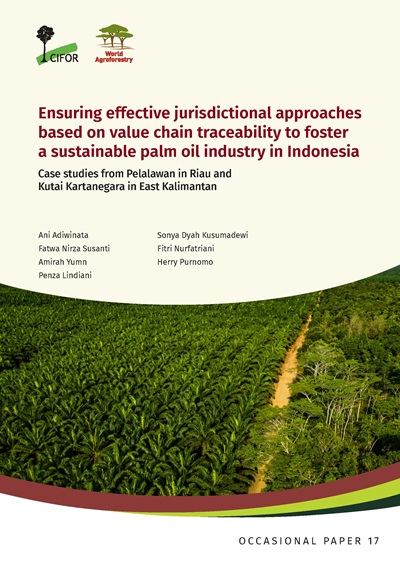An understanding of the palm oil industry’s value chains is key to ensuring effective integrated Jurisdictional Approaches (JAs) based on traceability, considering the involvement of actors in the production, processing and distribution of all products. Value chain traceability studies began by identifying national exporters and exporter groups, right back to management at the plantation level, including stages in palm oil processing and distribution. This in-depth study uses baseline data supported by companies’ certification documents and traceability reports data in two districts: Pelalawan in Riau Province and Kutai Kartanegara in East Kalimantan Province.
The results show that traceability varies depending on the category of value chain, the type of certification scheme, and the type of plantation management model. According to the value chain types, Type 2 palm oil is processed in mills and sent straight to exporter companies, as opposed to Type 1 palm oil, which is refined in refineries and is the predominant type for observed traceability cases in the two sites. Traceability also varies according to stages in the value chain – from plantation, mill, refinery, CPO production, PKO production, and the variations in each of these stages. The highest proportion of traceability cases was found in the two stages of ‘mill to plantation’ and ‘refinery to mill’.
It was apparent that the smallest amount of data for which traceability could be identified was at the plantation level. The study results also show that the most important business actors in the value chain are exporters and exporter groups, which play highly influential roles and apply the various certification schemes at every stage of the value chain, involving significant costs. A high percentage of exporters have integrated businesses ranging from plantation management to processing in palm oil mills and refineries. Understanding value chain structures and dynamics at the district and national levels is vital for policymakers, industry stakeholders and other parties in applying effective JAs to foster palm oil industry sustainability in Indonesia. District government plays an important role in leading the JA based on responsible practices within and across administrative boundaries by involving various stakeholders collaboratively.
DOI:
https://doi.org/10.17528/cifor-icraf/009356Altmetric score:
Dimensions Citation Count:
Publication year
2025
Authors
Nawir, A.A.; Susanti, F.N.; Yumn, A.; Lindiani, P.; Kusumadewi, S.D.; Nurfatriani, F.; Purnomo, H.
Language
English
Keywords
oil palms, value chains, plantations, certification, crop management, agribusiness, industry, sustainability, local government
Geographic
Indonesia






















